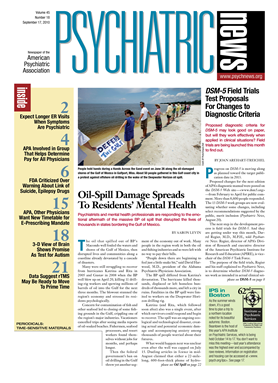Over the past few years, the APA leadership has been exploring ways to streamline the structure and function of the organization, reduce costs, and improve the level of service to you and the field of psychiatry. Toward this goal, the Board of Trustees and the boards of our three 501(c)(3) business entities—American Psychiatric Institute for Research and Education (APIRE), American Psychiatric Foundation (APF), and American Psychiatric Publishing Inc. (APPI)—recently approved a restructuring from four entities to two. APA is acquiring APPI; the other entity merges APIRE and APF.
For those of you unfamiliar with IRS guidelines regarding nonprofit organizations, the Internal Revenue Code defines a variety of charitable and business structures. APA is what is known as a 501(c)(6) tax-exempt entity—a “business league” defined as an association of persons having a common business interest. Such entities are organized to act on behalf of their members to promote that common interest and, importantly, are allowed under the tax code to establish political action committees (PACs) on behalf of their members' interests. The tax code allows contributions of dues payments made to 501(c)(6) entities to be deducted as business expenses. Most of our district branches are 501(c)(6) organizations.
Many medical societies also have a separate foundation to carry out research, public education, and fundraising activities. These foundations, under section 501(c)(3) of the tax code, are organized for charitable, scientific, and educational purposes, and generally contributions to these foundations are deductible for income-tax purposes.
To implement this reorganization, APPI and APA have entered into a purchase agreement to transfer the publishing business of APPI, along with the APPI name and imprint, to APA. This will enable our medical director and CEO, Dr. Jay Scully, to integrate publishing resources and products into future APA activities. APF and APIRE programs, including public education, fundraising, and many of our research fellowship and award programs, will be combined into one charitable 501(c) (3) affiliate under APF's name.
This acquisition and merger will reduce the number of audits, tax returns, and other regulatory filings and their respective costs, while simultaneously streamlining many of the functions of the (c)(6) organization and the current (c)(3)s. The subsequent realignment of programs and services will lead to more efficient functioning and improve member services such as providing resources for the maintenance of certification and licensure; developing practice management tools for activities such as setting up an office; helping members deal with third-party payers, including insurance companies, Medicare, and Medicaid; and more frequently updating DSM, which will be a “living document.”
We have been very fortunate in our family of entities to have very dedicated board members. The individuals who have served on the APIRE, APF, and APPI boards have brought a wealth of knowledge, expertise, and leadership to their work and have established programs that have had a highly positive impact in our field and in our communities.
The newly appointed board of the APF is composed of members nominated by the three previous (c)(3) entities: Drs. Jack Barchas, Grayson Norquist, and Jeffrey Lieberman from APIRE; Drs. Richard Harding and James Nininger, and Judge Steven Leifman from APF; and Drs. Laura Roberts, Donna Norris, and Amy Ursano from APPI. Dr. John Oldham, APA president-elect, Dr. David Fassler, treasurer, and Dr. Alan Schatzberg, the immediate past president, will serve as ex officio members, and Dr. Scully will chair the board.
Over the next year, these board members will devise principles of operation; develop new, needed programs; and recommend members for a scientific advisory board for both the APF and APA.
The reorganization is a very exciting and important development for APA, enabling it to operate more efficiently on our membership's behalf, continue to have a PAC, and at the same time pursue a more public-oriented mission. I look forward to continuing to share with you the ways in which the new structure will be able to facilitate the important work of APA and serve you better.


